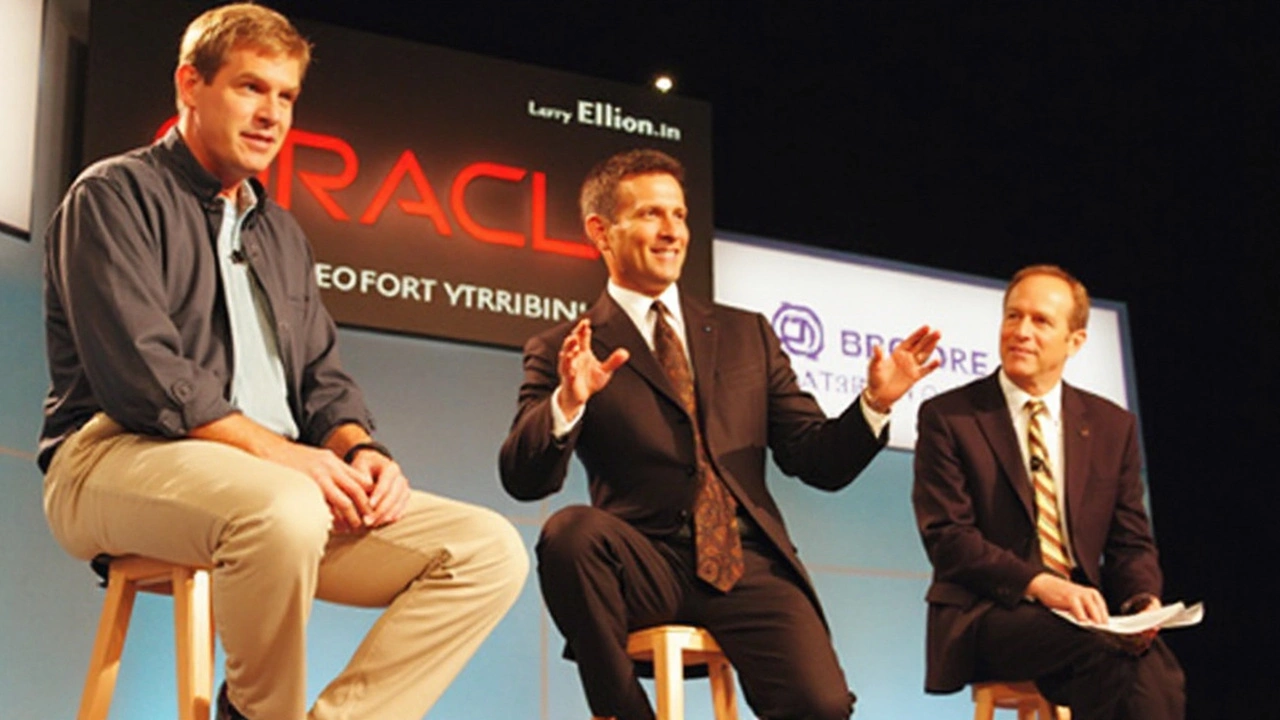Ellison jumps to No. 1 as Oracle rockets
Larry Ellison has edged past Elon Musk to become the world’s richest person, with a net worth of $393 billion, according to the Bloomberg Billionaires Index. The shift came after Oracle shares ripped 40% to $338 on Tuesday, following the company’s growth forecast that stunned Wall Street and ignited a buying frenzy.
The move delivered a jaw-dropping $101 billion one-day gain for Ellison, the largest single-day wealth increase since Bloomberg began tracking these swings. Musk sits at $385 billion by comparison, a reminder of how fast these rankings can flip when one mega-cap stock takes off.
Here’s the snapshot that moved the leaderboard:
- Oracle stock surged 40% to $338 after the company projected stronger growth.
- Ellison’s estimated fortune: $393 billion; Musk: $385 billion (Bloomberg).
- One-day wealth jump for Ellison: $101 billion — a record.
- Stake: Ellison owns about 1.16 billion Oracle shares.
Ellison, 81, co-founded Oracle in 1977 and ran it as CEO until 2014. He now serves as executive chairman and chief technology officer, a hands-on role that keeps him close to the company’s product roadmap and big-ticket customer relationships. That proximity matters, because Oracle’s latest forecast implies momentum where it most counts: cloud, AI infrastructure, and mission-critical databases.
The company didn’t just beat expectations; it changed the narrative around “old guard” enterprise software. The forecast signals faster growth ahead, driven by customer backlog and demand for compute-heavy AI workloads. Investors piled in, betting that Oracle’s cloud division and database franchises are set for a multi-year upgrade cycle.
This isn’t Ellison’s first windfall from a strategic bet. Oracle’s $9.3 billion purchase of NetSuite in 2016 — where Ellison held roughly a 35% stake — delivered him a $3.5 billion personal payout. He also took a seat on Tesla’s board from 2018 to 2022 after buying three million shares, an investment that tied him to Musk during Tesla’s own meteoric rise. And away from the markets, Ellison famously owns 98% of Lānaʻi, the sixth-largest Hawaiian island.
Wealth lists are snapshots, not verdicts. A surge driven by stock price means fortunes can fall as quickly as they climb. But this moment captures a bigger shift: the AI buildout is no longer just boosting chipmakers and hyperscalers — it’s lifting the software backbone that runs corporate data. Oracle sits right there, alongside its marquee database and a cloud platform built for heavy-duty workloads.

Why Oracle just became Wall Street’s favorite ‘old guard’ stock
Behind the move is a simple story: Oracle spent years retooling for the cloud, and it’s now selling what enterprises want — secure databases, high-performance compute, and multi-cloud flexibility. The company’s cloud infrastructure (OCI) is built for high-throughput, AI-friendly jobs, and it’s priced aggressively. That pitch has won a growing slate of big clients, many of them looking to train or deploy large AI models close to the data that runs their businesses.
Oracle has also embraced multi-cloud. The company deepened ties with competitors to meet customers where they are, allowing Oracle databases to run closer to workloads in other clouds. For CIOs, that means less friction and fewer compromises. For investors, it means a larger addressable market and better visibility into long-term contracts.
Several trends are converging: AI projects that need massive GPU clusters, regulated industries that can’t move data lightly, and a renewed focus on predictability after years of whiplash. Oracle fits that Venn diagram. Its database footprint is entrenched, its cloud unit is scaling, and its backlog — the contracted revenue due over time — has been expanding. When management guided to faster growth, the market recalibrated the entire equity story.
Ellison’s role hasn’t faded with age. As CTO, he’s been a vocal champion of building specialized infrastructure for AI training and inference, and he’s kept Oracle’s product playbook centered on performance and security. That engineering-first posture is paying off now that AI workloads are pushing infrastructure to its limits.
None of this erases risk. Oracle faces deep-pocketed rivals in cloud and databases; hiring GPU capacity is intensely competitive; and enterprise IT budgets can tighten if the economy slows. There’s also governance concentration to consider: with more than a billion shares, Ellison’s influence looms over strategy and capital allocation, from buybacks to capex.
Still, the market message is clear. Investors believe Oracle’s cloud and data franchises are entering a higher gear, and they’re rewarding the company with a valuation re-rate. That’s what catapulted Ellison to the top of the global wealth chart — not a windfall sale, but a surge in the price of the company he built.
A quick look back shows how steep the climb has been. In mid-2018, Forbes pegged Ellison’s wealth at about $54.5 billion. By mid-2020, he was seventh worldwide at $66.8 billion. Five years later, after Tuesday’s spike, the number sits at $393 billion. That arc tracks Oracle’s transition from a license-heavy model to a subscription and cloud-first business, a shift that took years of investment and more than a few skeptics.
What to watch next? How Oracle converts this forecast into realized revenue, whether cloud margins continue to expand as scale kicks in, and how quickly new AI contracts go live. If those pieces fall into place, the company’s growth story has room to run — and the billionaire leaderboard might keep reshuffling in its wake.





